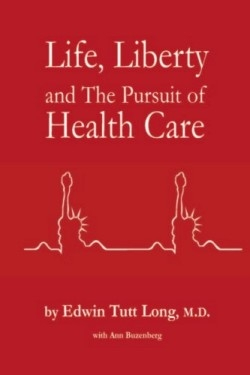Life, Liberty and the Pursuit of Health Care
“It’s a poor system that does its best to avoid being responsible for the sickest people while making profits by doing so,” the author writes. The expensive and dysfunctional medical system of the United States is being outperformed not just by Canada, but by Australia and pretty much every country in the European Union. Universal health care is coming, Long predicts, whether the players want it or not. This book outlines a plan that would produce good coverage for all citizens, but still provide incentives to private sector insurers not to leave the arena.
The author fingers two failed models of patient care: the fee-for-service approach which errs on the side of generating unneeded but expensive tests, treatments, and medications, and capitation which rations outpatient care with dangerous parsimony. A third approach, identified here as pay-for-performance rewards good outcomes and effective prevention; it seems to hold promise.
The interests of the players in the field of health care are well accounted for; the author points out an oft-overlooked group, of which he is a member—the technological innovators, whom he aligns with pharmaceuticals, labeling them together with the moniker “The New-Makers.” Long finds enough blame for the dysfunctional situation in the United States to spread around: the insurers labor to exclude the heaviest utilizers; the doctors overtreat or underserve depending on the rewards scheme; the indigent seek costly ER care for non-emergency conditions; the legislators perennially lack courage.
In essence Long seems fair, sensible, and solutions-oriented, but he’s too soft on big pharma. He cites no sources for a lowball statement that flies in the face of conventional wisdom: “Yet if all the drug company profits were refunded, health care costs would fall by only about 1.2 percent.” The currently massive difference between the prices of brand-name drugs and generic substitutes surely suggests a much larger opportunity for efficiency. Despite that off-target estimation, Long is no one’s apologist; if he was, he wouldn’t lay out summaries of plans such as Dennis Kucinich’s, among others.
The author frames the need for reform as a basic moral issue, asking rhetorically, “Is health care to remain only for the fortunate in America?” Besides “privately mandated, insured universal coverage,” there are gains to be made by adopting best practices, expanding preventative care and basing insurance payouts partly on companies’ willingness to cover a reasonable share of the seriously ill. A few more details about how to make new technologies affordable without stymieing future innovations might have been appropriate, given the author’s direct expertise.
This straight-talking, plain-English book defines the problem that threatens to swallow both government and individual citizens’ budgets whole, and points to some remedies without hemming and hawing. It is useful coverage for the consumers of health care, who can tell that the system is too broken to be salvaged by a simple bandage.
Disclosure: This article is not an endorsement, but a review. The publisher of this book provided free copies of the book and paid a small fee to have their book reviewed by a professional reviewer. Foreword Reviews and Clarion Reviews make no guarantee that the publisher will receive a positive review. Foreword Magazine, Inc. is disclosing this in accordance with the Federal Trade Commission’s 16 CFR, Part 255.

